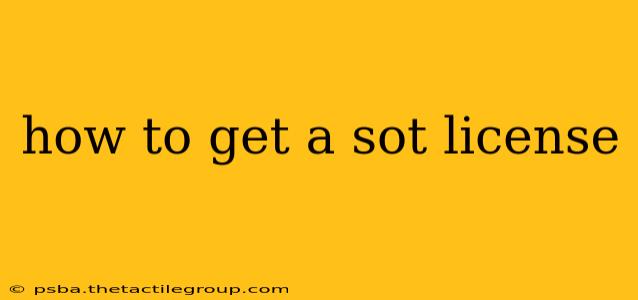Securing a Special Occupational Tax (SOT) license might seem daunting, but understanding the process simplifies things considerably. This guide breaks down the steps involved, clarifies common misconceptions, and provides crucial information to help you navigate the application process smoothly.
What is a Special Occupational Tax (SOT) License?
The Special Occupational Tax (SOT) is a federal tax imposed on certain businesses involved in the production, import, or sale of alcohol, tobacco, firearms, and wagering. This isn't a business license in the traditional sense; it's a federal tax registration required by the Alcohol and Tobacco Tax and Trade Bureau (TTB). Obtaining an SOT license allows you to legally operate within these regulated industries. Failure to obtain the appropriate license can result in significant penalties and legal repercussions.
Types of SOT Licenses
The TTB offers various SOT licenses, each tailored to specific activities. The type of license you need depends on your business operations. Some common types include:
- Retail Dealer in Beer: For businesses selling beer at retail.
- Retail Dealer in Wine: For businesses selling wine at retail.
- Retail Dealer in Distilled Spirits: For businesses selling distilled spirits at retail.
- Wholesaler of Beer: For businesses wholesaling beer.
- Wholesaler of Wine: For businesses wholesaling wine.
- Wholesaler of Distilled Spirits: For businesses wholesaling distilled spirits.
- Manufacturer of Beer: For breweries.
- Manufacturer of Wine: For wineries.
- Manufacturer of Distilled Spirits: For distilleries.
It's crucial to identify the correct license type based on your business activities. Contacting the TTB directly is highly recommended to ensure you select the appropriate license.
Steps to Obtain an SOT License
The application process involves several steps:
1. Determine Your Eligibility and Required License Type
Before starting the application, carefully review the TTB's website to confirm your eligibility and the specific SOT license your business requires. This step is crucial to avoid delays and potential rejection.
2. Complete Form 5630.8
This is the primary application form for SOT licenses. Complete it accurately and thoroughly, providing all necessary information. Any inconsistencies or missing information can delay the processing of your application.
3. Gather Required Documentation
Along with Form 5630.8, you will need to provide supporting documentation, which may include:
- Proof of Business Ownership: Such as articles of incorporation or a business license.
- Proof of Business Location: Such as a lease agreement or deed.
- Details of Business Operations: A clear description of your business activities.
- Financial Information: Depending on your business type and scale.
4. Submit Your Application
Submit your completed application and all required documentation to the TTB. You can generally submit your application electronically through the TTB's website or via mail. Check the TTB's instructions for the preferred method.
5. Pay the Tax
Once approved, you'll need to pay the applicable Special Occupational Tax. The amount varies depending on the type of license and your business location.
Important Considerations
- State and Local Licenses: Remember that an SOT license is a federal tax registration. You'll likely need additional state and local licenses and permits to operate legally in your jurisdiction. Check with your state and local authorities for their specific requirements.
- Compliance: Maintaining compliance with all federal, state, and local regulations is paramount. Failure to do so can lead to penalties, license revocation, and legal action.
- Seek Professional Advice: If you're unsure about any aspect of the process, it's always best to seek advice from a tax professional or legal expert familiar with TTB regulations.
This guide provides a general overview. For the most accurate and up-to-date information, always consult the official Alcohol and Tobacco Tax and Trade Bureau (TTB) website. Accurate and complete information is crucial for a successful application. Remember that this information is for guidance only and should not be considered legal advice.

